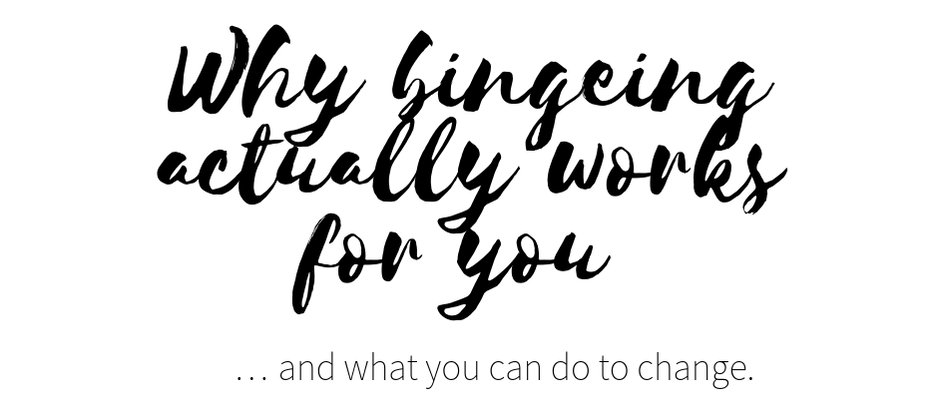|
It’s easy to get down on yourself when you binge or overeat. As bingers and overeaters, we're way too familiar with the negative thought spiral after a binge - I’m a quitter, I just can’t control myself around food, it’s hopeless, this is just the way I am.
The worst part is thoughts like this lead to despair that fuels the urge. We feel hopeless to stop overeating, so we overeat. A great thought-shift to use when you are stuck like this is to look at how binge and overeating are working for you. Weirdly, acknowledging how binge eating is working for you can create enough self-acceptance and compassion to loosen the grip of negative thoughts in a binge eating spiral. You’re not crazy. Looked at the right way, binge and overeating make sense. If there’s one thing I’ve learned in coaching, self-acceptance and compassionate awareness are the first step to change. After acceptance it’s important to return to the basic premise of all of my motivational work: The reason we do anything is because of how we think it will make us feel. So, I’ll just list some of the benefits binge eating offers us:
There’s also a relief from the pain of isolation caused by the shame of overeating. The thing is, when we experience shame we tend to isolate ourselves, and when we isolate ourselves we are setting ourselves up for a binge. There was a famous study conducted by behavioural psychologists called the ‘Rat Park’ study where rats put in isolation preferred opioid-laced water over plain water, while rats in a ‘park’ setting with other rats consistently preferred plain water. This study was done after it was observed that not all veterans of the Vietnam War became opioid addicts when they had opioids for pain relief at war. While the study had flaws, the finding was the difference was social connection. Social connection created less need for artificial stimulation. You can create connection by simply listening to yourself. Try connecting with yourself by acknowledging and accepting your current thoughts and feelings just as they are without trying to immediately change them. Building a good working relationship with yourself can be like parenting you need to have both a strong emotional connection but also have authority over yourself. Let me explain using four types of parenting identified by researchers*. Of the four types, the Authoritative style is the most effective.
When we allow ourselves to binge, we are caring for ourselves in the way that a permissive parent might care for a child. Essentially, we are saying “I know you are in pain, have whatever you want.” While kind, it doesn’t stop bingeing. When we are critical and punishing with ourselves and restrict food we are treating ourselves like an authoritarian parent by emotionally rejecting the part of us that wants to overeat. There’s no emotional connection with our feelings, and this just adds to the stress. Ultimately, we rebel and overeat anyway. When we are present with our thoughts and feelings without allowing ourselves to act on them, are acting authoritatively. We begin to build a relationship with ourselves where we are in control of our actions, aware of our thoughts and accepting of our feelings. We care for ourselves without allowing ourselves to do what isn’t good for us. Instead, we take the time to connect with ourselves by writing down our thoughts, feelings and actions. We take time to work on changing thoughts that drive the feelings of the need to perform the action of overeating. Treating ourselves with compassion while developing a strong relationship with ourselves in terms of honouring our commitments is part of exercising personal authority over our lives. We are all capable of change, we just need the right tools. Let me know if you want more help finding them. Drop me a line at lydia@lpattison.com or book a free no obligation consult session at www.lpattison.com. I’m currently taking new clients. Maybe that’s you! *Baumrind D. 1966. Effects of authoritative parental control on child behavior. Child Development, 37(4), 887-907. Comments are closed.
|
|
This work is for people who are healthy who would like to help to manage unhelpful behaviours that are keeping them stuck. This is not the place for you if you feel you have mental health issues that disrupt your life.
By reading my coaching website and blog, and any associated email series, you acknowledge that I am not a licensed psychologist or health care professional and my services do not replace the care of psychologists or other healthcare professionals.
Lydia Pattison 2023 All rights reserved. Privacy
By reading my coaching website and blog, and any associated email series, you acknowledge that I am not a licensed psychologist or health care professional and my services do not replace the care of psychologists or other healthcare professionals.
Lydia Pattison 2023 All rights reserved. Privacy

